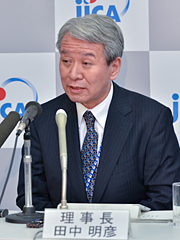At his first news conference since becoming JICA’s new president, Akihiko Tanaka said official development assistance (ODA) should be increased, a measure which would help not only developing countries but also Japan itself.
Tanaka, a lifelong academic, specialist in international politics and Vice President of the University of Tokyo until he became JICA president on April 1, succeeded Sadako Ogata who retired after 8 ½ years as head of Japan’s major development agency.
At his first news conference on April 10, he outlined his broad agenda for his tenure including four major points:

Tanaka speaks at his news conference
-- Japan’s official development assistance (ODA) should be increased on the premise that JICA should aggressively promote its own reform. Appropriate provision of assistance to developing countries will lead to a better international community as a whole as manifested in China and South Korea which are used to be recipient countries but are now donor countries. Together with these countries, Japan should positively commit itself to building a better world in terms of both quality and quantity of ODA.
--It was essential, he said, that the Japanese public, which finances ODA through their taxes, should understand and support the overall aims of development assistance. “I would like the Japanese people to understand that assistance to help invigorate the world will invigorate Japan as well,” he emphasized several times.
--JICA needs to ‘systemize’ Japan’s many years of accumulated development experience to take a leading role in shaping global agenda in this field.
--And fourthly, JICA should work closely with other development partners such as government agencies, private sector, NGOs, universities and local governments for pursuing effective and efficient development activities, which should be a key part of Japan’s overall diplomatic strategy.
At the field level, Tanaka said JICA would pursue its vision, ‘Inclusive and Dynamic Development” and among other aims would try to closely tailor assistance—either in the form of technical assistance, yen loans, and grant aid with the specific needs of individual countries.
If, for instance, a developing country faced ongoing civil unrest, assistance should be targeted to first ending conflict and a cycle of violence.
Once a country had achieved a ceasefire, the president said, then “peace building and systems creation will be important as well as assistance for education and improving health and hygiene for poverty reduction.”
In such a step by step approach, this could then be followed by infrastructure development, the creation of industrial clusters to boost overall economic growth and projects to combat environmental degradation, social disparity and governance issues.
In response to a question about private sector activities in development assistance, he said JICA will enhance the collaboration with other relevant partners for supporting small and medium sized Japanese companies in expanding their overseas operations.
He said he was eager to see first hand, JICA’s field operations and will make his first overseas visit to the Philippines to attend the ADB annual meeting and to see some field activities there later in April.




scroll